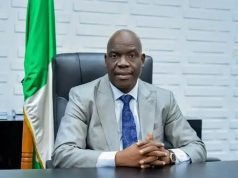By: Taiwo Akerele
Today again creates another window for the world and its leaders to reflect on the condition of children across the globe, the fate of their education, the security of the learning environment, the key issue of nutrition and global child rights and freedom of learning and knowledge acquisition.
The global pandemic, COVID-19 has forced millions of children all over the world to learn from home, how conducive these homes are. These bring to the fore the need for concerted efforts to ensure that families are catered for by governments in the area of jobs creation, shelter and adequate feeding which has resultant effect on the condition of the child.
In Nigeria, the conditions are even worse and this day, the 27th of May 2021, is an opportunity for stakeholders to reflect on key policies that have direct bearing on learning, literacy development and the rights of the child.
Today, we have an opportunity to review the impact of school feeding and how this program fared in terms of impact and outcome, today we have an opportunity to look at the issue of nutrition and the child rights law already passed by the national assembly and some states across Nigeria. How has the law been implemented and a far reaching impact on the targeted populace.
Today Nigeria is faced with the crisis of out of school children estimated at 10.5 million by the UNICEF (2019/2020) which Policy House International has projected to get to 15million by the end of 2021 if the security challenges in parts of the north are not addressed and if the culture of school closures continues unabated.
Today in Nigeria, the average national budget provisioning for the entire education system accounts for less than 5% of the national budget as against the 26% recommended by UNESCO. Out of this 5%, only 1.5% is provided to basic education, at the state level the situation is not different on the average nationally. This calls for serious concern. So the key question is what quality of children we are grooming in Africa’s biggest economy by Gross Domestic Product (GDP) and by population.
Today, Children’s Day affords us the opportunity to look at our national basic education curriculum, what does it reflect on for us as a nation? Does our curriculum prepare our children for a digital economy? An artificial intelligence economy, an economy that is ready for production, agri-business and manufacturing or a lazy and unproductive economy full of theory and empty in practical?
As we join millions of children all over the world to celebrate this day, for us in Nigeria, we must reflect on the basket of issues both as government and stakeholders in the educational ecosystem and get our acts together to make life more bearable for our kids, the leaders of tomorrow. Happy International Children’s day 2021.
Thank you.
Taiwo Akerele is the Country Reps, Policy House Int’l and FCT Chapter Chairman, Association of Nigerian Authors (ANA)







